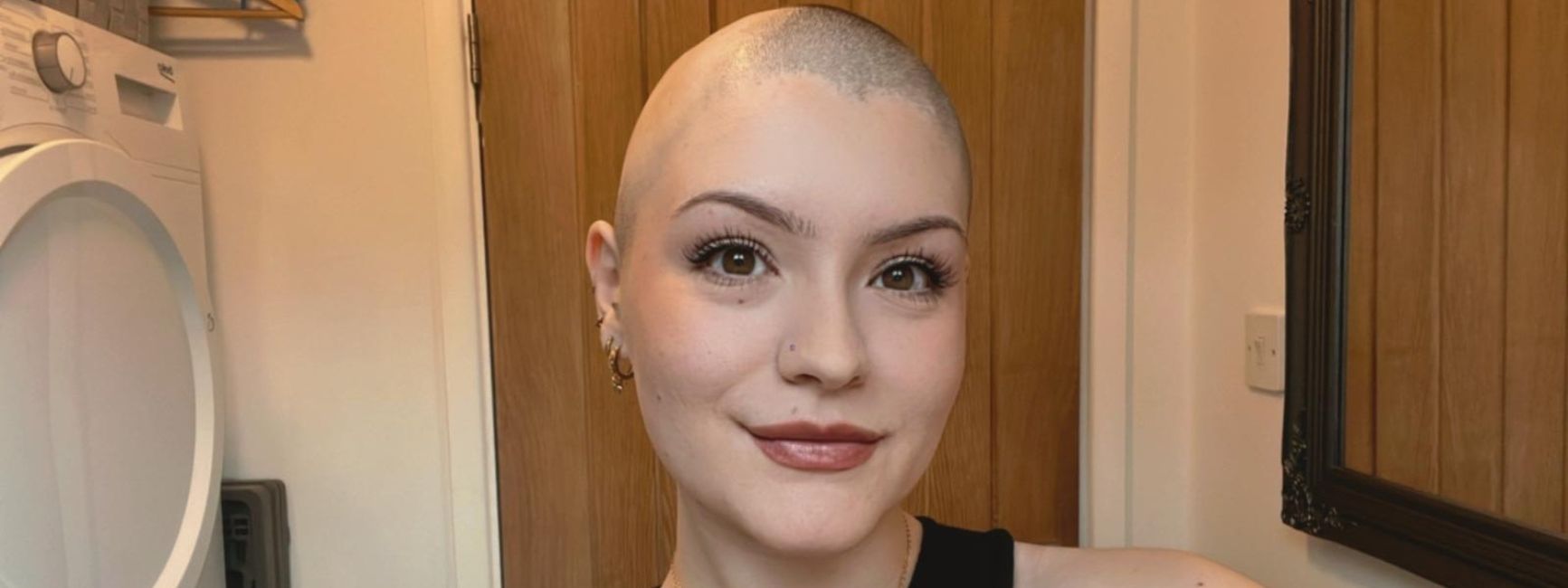For Teenage and Young Adult Cancer Awareness Month, Tianna Davies shares what it’s like to be one of the 260 young people, aged 13 to 24, in the UK each year to receive a brain tumour diagnosis…

Pink, orange, purple, red – I’ve dyed my hair a kaleidoscope of colours since my teens. I was never one to shy away from experimenting with different looks. And now I’ve got brain cancer and a bald head, I’m not shying away from that either.
No one ever expects to be told they have a brain tumour, especially at 24. You’re just starting out really, figuring out what you want to do and who you want to be. For me, that was finding a job as a mortgage administrator for Nationwide, going to festivals and gigs with my friends, Pilates, and planning my next trip; these were the things that were important to me.

It was on a windy walk with my parents, Hector and Caroline, and our dogs, Bella and Mia, near our Northampton home in January 2023, that my ears began to hurt. Over the coming days, sinus pressure and runny eyes were joined by double vision and dizziness, like I was drunk.
Then out of nowhere, the headaches hit. Excruciating pain keeping me up all night that painkillers didn’t touch. I went to the doctor twice and A&E six times when the pain was unbearable, where I was told it was cluster migraines.
When I Googled my symptoms, the top two probable causes were a trapped nerve or a brain tumour. But the doctors didn’t seem concerned and I’d never liked dealing with hospitals anyway, so I was ready to give up trying.
Mum wouldn’t let it go though. That March, she booked an appointment with a private neurologist, who spotted bleeding behind my eyes and sent us straight to hospital.

After lots of tests, I knew what the doctor was going to say before he said it. They’d found a mass on the left side of my brain. My parents broke down but it felt surreal to me, like I was detached from it all.
“If we don’t operate now it will either paralyse you or kill you,” said my neurosurgeon, Mr Richard Stacey, at John Radcliffe Hospital in Oxfordshire. I appreciated his honesty, not dancing around the issue or treating me like a child.
A debulking surgery removed most the tumour and the headaches stopped. But my memory was wrecked. I couldn’t remember words and I’d forget to do the most basic things – eating, drinking, taking tablets – without Mum to remind me.

A biopsy showed that I had a grade 3 ependymoma. It was cancerous. I didn’t let myself think about what that meant, I just wanted to know how to treat it.
An awake craniotomy in October to remove the rest of the tumour followed, then proton beam therapy. Two weeks in, my long brown hair started coming out, first some strands, then in clumps, until I had a perfect bald circle covering half my head.

But it kept getting worse. Between the hair loss from the surgery and the hair loss from the therapy, I had short bits sticking up and a bald patch. I could feel people staring, trying to work out if there was something wrong with me. So, I made a decision.
Sitting on a kitchen stool in January, Mum ran hair clippers over my head. With every chunk of hair that fell to the floor, I felt a little lift, like I was taking back control.

I didn’t feel sentimental – I’d done everything I wanted to do with my hair over the years. I was more worried about Mum. She’s always been emotionally attached to my hair, spending hours styling it in pigtails and plaits when I was a little girl. The only daughter – I have two older brothers, Nathan and Jordan – I thought she’d be hysterical.

But as my freshly bald head was revealed in the mirror, we both smiled with relief. “You look amazing,” she said.

When I posted photos on my social media, the positive comments rolled in. Even strangers in the street were stopping to say that I looked good and that helped me get through the times it bothered me when people stared.
But it wasn’t only my look that had changed. My whole perspective on life had shifted too.
Now, instead of thinking I haven’t got time or it isn’t the right time to do something, I’ll make it happen. And I listen to my body in a way I never used to. That’s why I want to share my story during Teenage and Young Adult Cancer Awareness Month, because brain tumours can affect anyone at any age and it’s vital we don’t ignore the symptoms.

Young people have different challenges when it comes to healthcare – we don’t find it easy to talk about our health problems and we often feel as though we’re treated like children. But with brain tumours claiming more young lives than any other cancer, we can’t be left to fall through the cracks.
I’ve no idea if my hair will grow back or, because of fatigue and memory loss, when I’ll be able to go to a gig with my friends again. But every day I find something to feel positive about, no matter how small, and that gets me through.

You can help to find a cure for young people like Tianna by making a donation, joining a fundraising challenge or campaigning with us. Click here to find out more.
Related reading:

